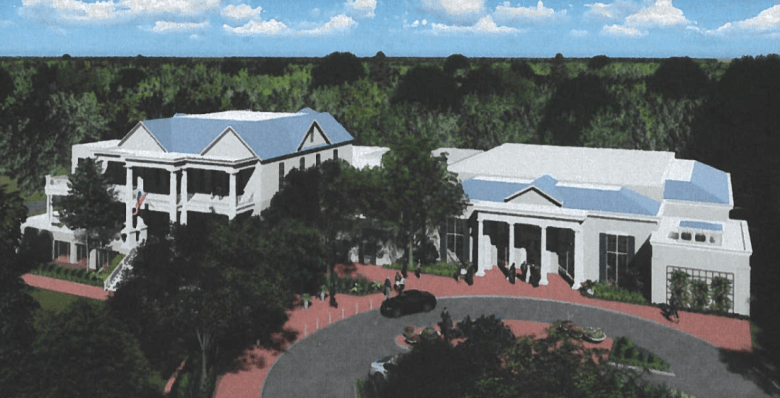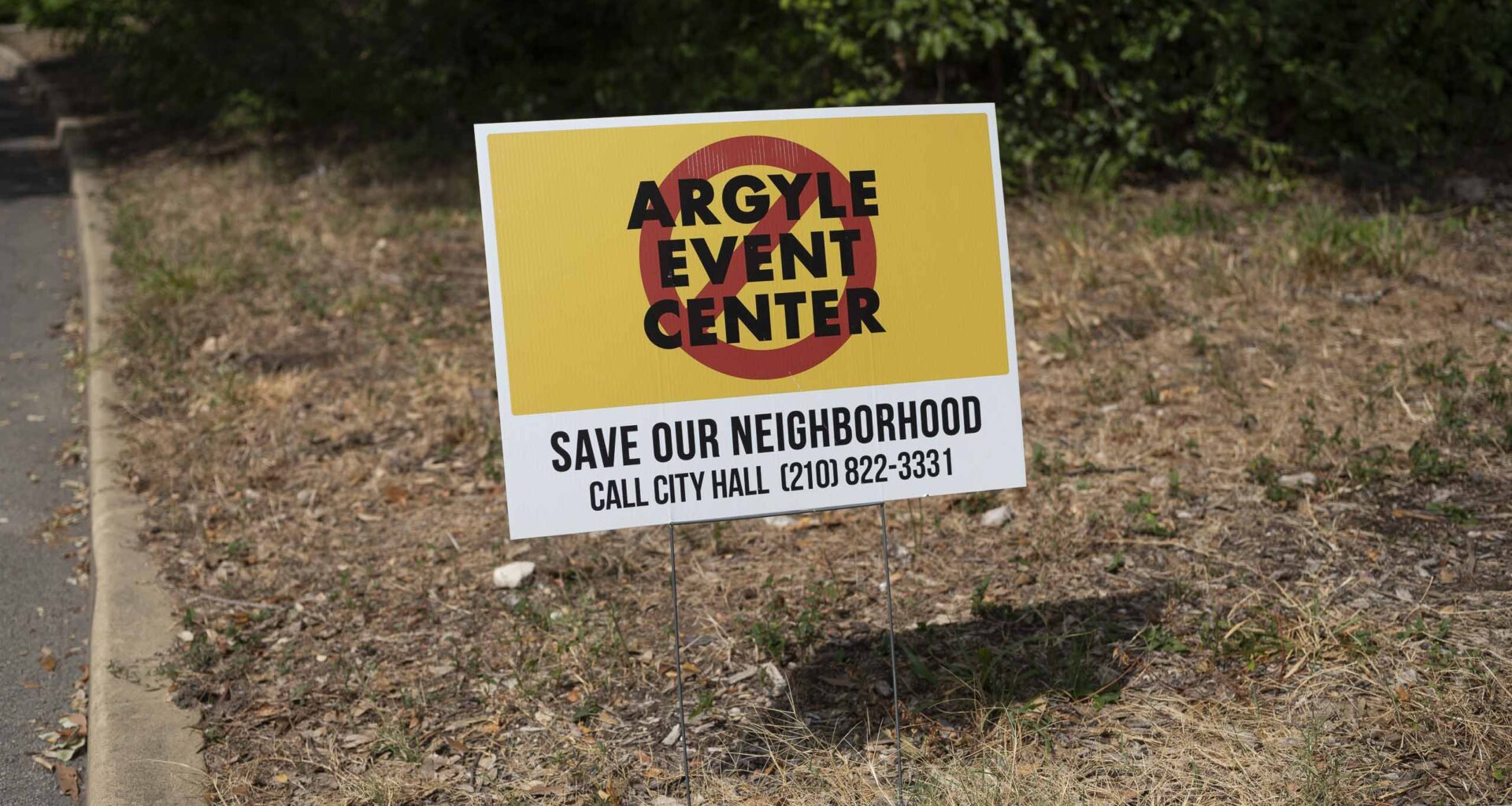Some Alamo Heights residents are calling for several elected officials to recuse themselves from voting on a contentious proposal to expand The Argyle.
Why? Because they are members of the renowned private dining club.
Alamo Heights City Council is scheduled to meet Aug. 11 to consider The Argyle’s request for a special use permit that, if granted, would expand the capacity of the club’s property to accommodate events for more than 1,000 people. The meeting will start at 5:30 p.m. at City Hall, 6116 Broadway St.
Opponents of the proposal say that expanding The Argyle’s capacity could negatively impact the surrounding residential neighborhood. Alamo Heights is a wealthy enclave just north of downtown San Antonio that’s home to about 7,300 residents.
On Wednesday, attorney Fred Junkin representing the Neighborhood Preservation League of Alamo Heights, a grassroots group, asked for any of Alamo Heights’ elected leaders who are Argyle club members to recuse themselves from deliberating on the issue in order to avoid a possible conflict of interest.
Junkin cited part of the city’s code of ordinances that ensures city leaders “work for the common good” and not “for any private or personal interest.”
“It is apparent that, as members of The Argyle, each of you has a personal interest in the disposition of the SUP application,” Junkin wrote.
Alamo Heights Mayor Al Honigblum and two of the five at-large council members, Blake Bonner and Lynda Billa Burke, belong to the club.
City Attorney Frank Garza responded on the city’s behalf on Friday, saying there is no definition of personal interest in the city’s ethics code. He instead cited the definition of “substantial interest” in state law to determine that council members who are club members may deliberate and vote on the permit.
“If I were to accept your interpretation, no elected official who has a Frost Bank account would be able to vote on the city’s bank depository contract since the city contracts with Frost to provide the city’s banking needs,” Garza said of Junkin’s letter.
 A rendering shows what the proposed 6,600-square-foot Argyle Hall could look like. Credit: Courtesy / Argyle Club
A rendering shows what the proposed 6,600-square-foot Argyle Hall could look like. Credit: Courtesy / Argyle Club
The Argyle’s history and possible future
Efforts to expand The Argyle property started to unfold in 2021 when it notified the city of plans to build a 10,000-square-foot addition onto the existing structure at 934 Patterson Ave. and extend the property onto an adjacent lot at 820 Patterson.
The Argyle’s origins date back to the 1850s when the property first served as the headquarters of a horse ranch. A century later, the organization that would become the Texas Biomedical Research Institute bought the land and began leasing it to then-newly formed nonprofit The Argyle, whose membership helps to raise funds for the private research institute.
The Argyle has about 1,500 members.
The private club’s original expansion plan has undergone revisions since 2021.
If council were to approve the current proposal, The Argyle will be able to accommodate up to 1,200 people for events that are partially hosted in an outdoor area.
The deal would also include hosting a maximum of 52 smaller private events a year where attendance is between 251 and 1,200; and host private events with up to 250 attendees any other time.
Opponents’ concerns
NPLAH President Ann McGlone claims the special use permit could turn The Argyle from a private dining club into an event venue in the middle of a residential neighborhood.
She’s one of several critics of The Argyle’s permit request who have attended public meetings in recent months, signed petitions and displayed yard signs in opposition.
“The 52 events a year with 251-1,200 people is exponentially higher than the eight or nine events that The Argyle has been doing,” McGlone added.
McGlone said while club management has had a historically friendly relationship with neighbors, several residents fear city officials may pay more attention to what The Argyle ownership wants than what other residents want.
McGlone also said Argyle representatives have not adequately addressed public worries about how an expanded club could increase local traffic and noise levels during private events.
“When you’re putting up a large commercial establishment that could compete with the likes of the Witte Museum or downtown hotel ballrooms, it will have an impact on the neighborhood,” she added.
Former Mayor Louis Cooper, now a member of The Argyle’s board of directors, said the club seeks to keep pace with how people are changing the way they typically book a private event, such as a large party or wedding celebration. One way of achieving this, Cooper said, is for The Argyle to enlarge its indoor facilities.
Cooper also said The Argyle aims to continue being a good neighbor by having additional indoor space to better insulate live musicians or a DJ at the event, and by expanding parking space in order to prevent guests from parking their vehicles on neighborhood streets.
“By soundproofing the music and putting the band inside, we can be a better neighbor,” Cooper said.
Documents attached to the request indicate that the club requires 480 off-street parking spaces for members and guests, and another 50-100 spaces for club and event staff, security and vendors.
The proposed permit would provide 245 additional spaces, including 81 spaces on TBRI property and 56 leased spaces across the road from the club. Approximately 22 spaces will be lost to construction of the building addition, according to the SUP documents.
Junkin asked city leaders to keep the wider community’s best interest in mind while weighing The Argyle’s proposal.
“I don’t think anyone can deny that anyone who has a vested interest in The Argyle shouldn’t deliberate or vote on a SUP application involving the club,” he said.
He also disagreed with the city attorney’s assertion that club members/council members may not have a conflict of interest.
“Mr. Garza’s interpretation of the standard for disqualification is not supported by the plain language of the code of ethics, and does not conform to ‘the letter and spirit of the laws and policies affecting the operations of government’ embodied in that code,” he added.
Honigblum, who was elected in May, acknowledged The Argyle’s expansion proposal has sparked much public attention.
“Anytime the community is divided on an issue, it’s a high-profile thing given how tight-knit our community is,” Honigblum added. “But it is an isolated matter because of where the club is located in our city.”
